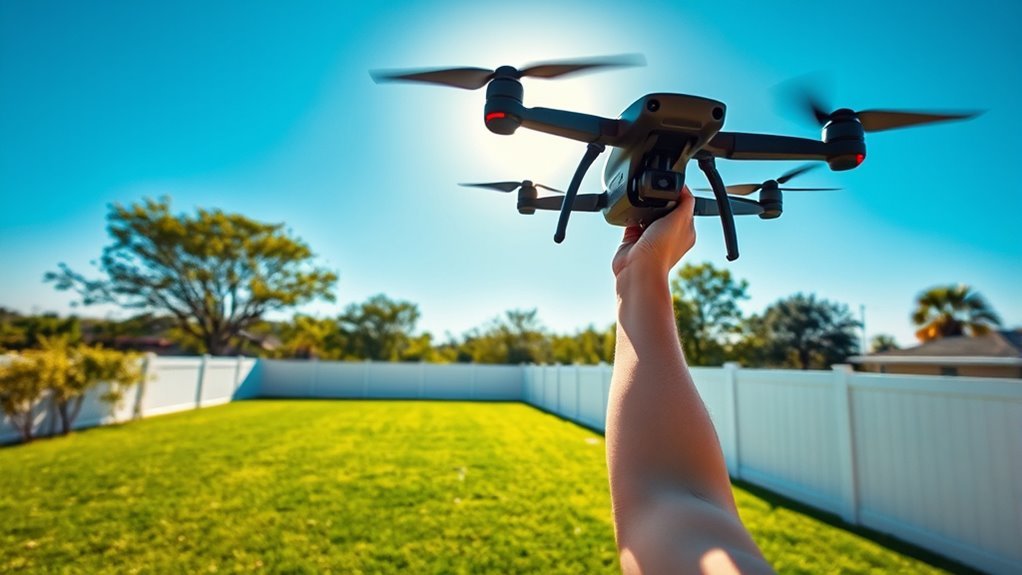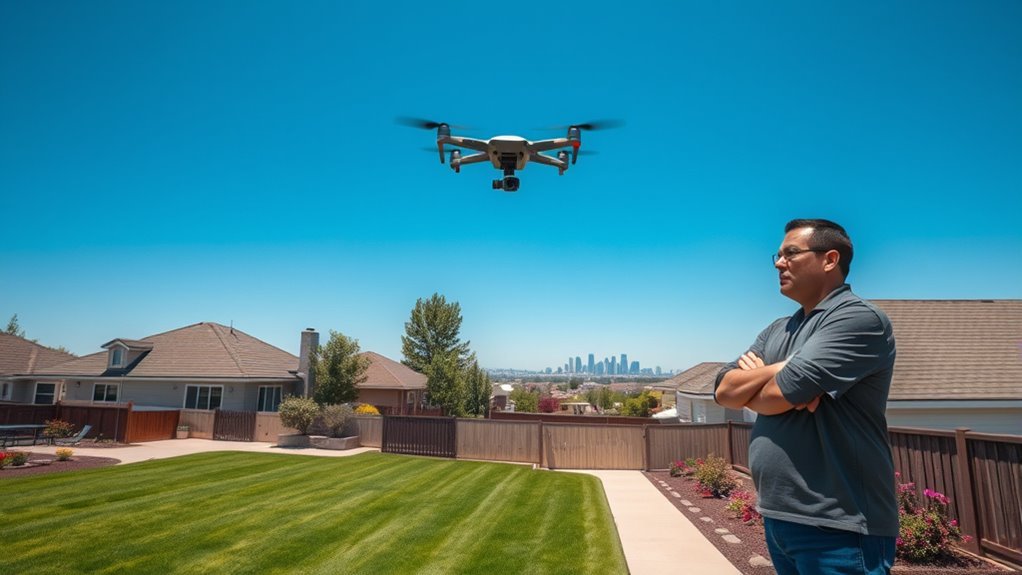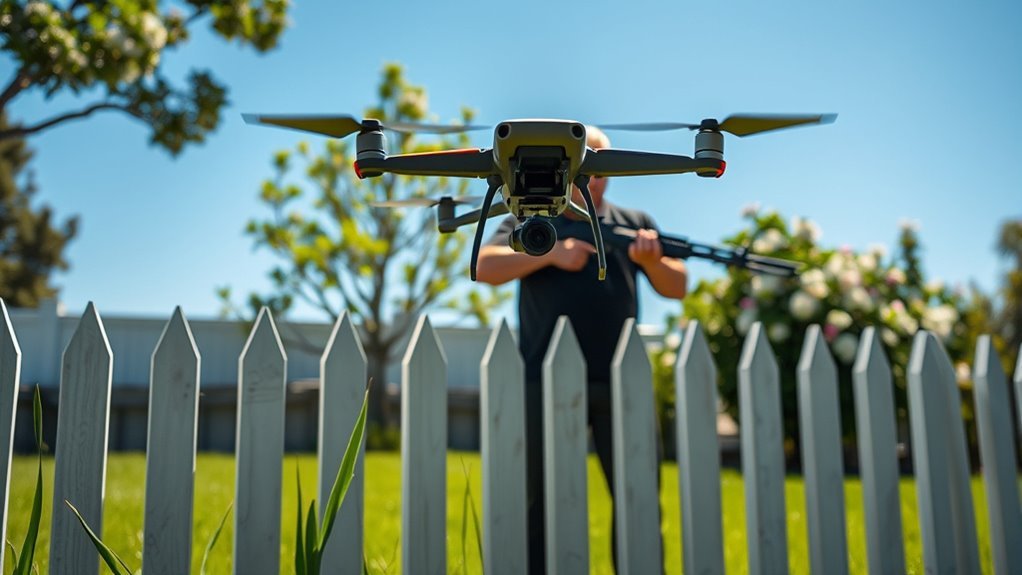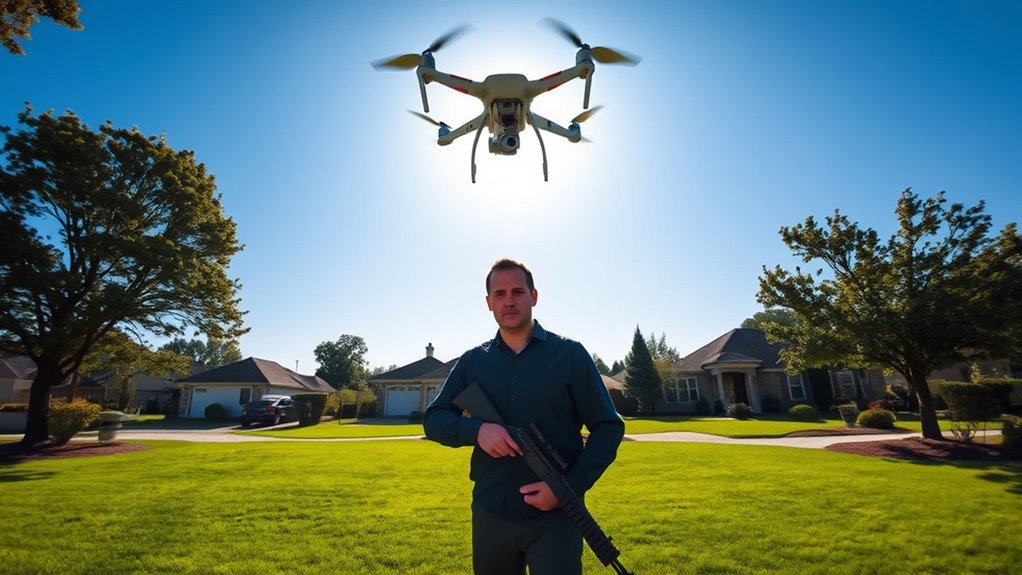You’re not allowed to shoot down a drone flying over your property. Federal law, including FAA regulations, protects drones operating within regulated airspace and classifies them as aircraft, making it illegal to destroy or interfere with them. Doing so could result in criminal charges, civil liability, or both. Property rights don’t extend to unrestricted control of airspace above your land. If you want to understand your options and legal protections further, keep exploring the topic carefully.
Understanding Property Rights and Airspace

Although property ownership grants you specific rights, it doesn’t extend indefinitely into the airspace above your land. Your rights are subject to defined airspace boundaries established by law, which balance your freedom with public and governmental interests. You can’t claim absolute control over every cubic inch above your property; instead, ownership typically covers the immediate reaches necessary for your ordinary use and enjoyment. This means drones flying at regulated altitudes may legally traverse above your land without constituting trespass. Understanding these airspace boundaries is essential to protecting your rights while respecting federal regulations. Exercising property ownership without acknowledging these limits can result in legal repercussions. Consequently, while you own the ground and structures, your authority in the vertical dimension is constrained, ensuring a harmony between private freedoms and public airspace rights.
Federal Laws Governing Drone Operation

While property rights limit your control over airspace, federal statutes establish clear parameters for drone operation to guarantee safety and order in national airspace. Federal regulations, primarily enforced by the Federal Aviation Administration (FAA), mandate specific rules for drone pilots, including registration, altitude limits, and prohibited zones. These rules assure that drones operate without endangering manned aircraft or infringing on public safety. Drone enforcement actions target violations such as unauthorized flights over restricted areas or failure to comply with operational standards. You must recognize that these federal regulations supersede individual claims to airspace control above your property. Understanding this framework is significant to preserving your freedom while respecting the legal boundaries set forth to maintain aviation safety nationwide. Compliance protects you from legal repercussions and supports responsible drone use.
Legal Consequences of Shooting Down a Drone

If you decide to shoot down a drone flying over your property, you could face serious legal consequences. Under federal law, drones are considered aircraft, making the act of shooting one down potentially a violation of the Federal Aviation Act. This exposes you to criminal charges, including destruction of aircraft and endangering public safety. Additionally, you may incur significant legal liability for property damage or personal injury resulting from your actions. State laws may impose further penalties, amplifying your risk. While protecting your property is natural, taking violent measures against drones can lead to prosecution and civil suits. Instead, understanding your rights and pursuing lawful remedies is essential to safeguard your freedom without crossing legal boundaries.
Privacy Concerns and How to Address Them
Beyond the legal risks of damaging drones, concerns about privacy have become a significant issue for property owners. You must understand that drone privacy laws vary, but unauthorized surveillance or photography can constitute a property invasion under certain jurisdictions. While you have the right to protect your private space, this right is balanced against federal regulations governing airspace. To effectively address drone privacy issues, document incidents meticulously and familiarize yourself with local statutes related to aerial surveillance and harassment. Recognize that invasions of your privacy by drones can undermine your freedom to enjoy your property securely. Accordingly, exercising your rights demands both awareness of drone privacy protections and adherence to the law, ensuring you defend your space without violating federal airspace rules or provoking unintended legal consequences.
Alternative Actions to Take When a Drone Invades Your Space
Whenever a drone encroaches upon your property, you need to act promptly and within legal bounds to assert your rights effectively. Shooting the drone is generally prohibited and may expose you to legal liability. Instead, consider alternative resolutions such as documenting the drone interference—take photos or video to record the intrusion. Notify local law enforcement or the Federal Aviation Administration if regulations are violated. You may also communicate directly with the drone operator, if identifiable, to resolve the issue amicably. Installing privacy screens or physical barriers can deter future incursions. Understanding your jurisdiction’s drone laws empowers you to respond appropriately without overstepping legal boundaries. Exercising these measured, lawful actions protects your freedom and property rights while avoiding unnecessary legal complications.

